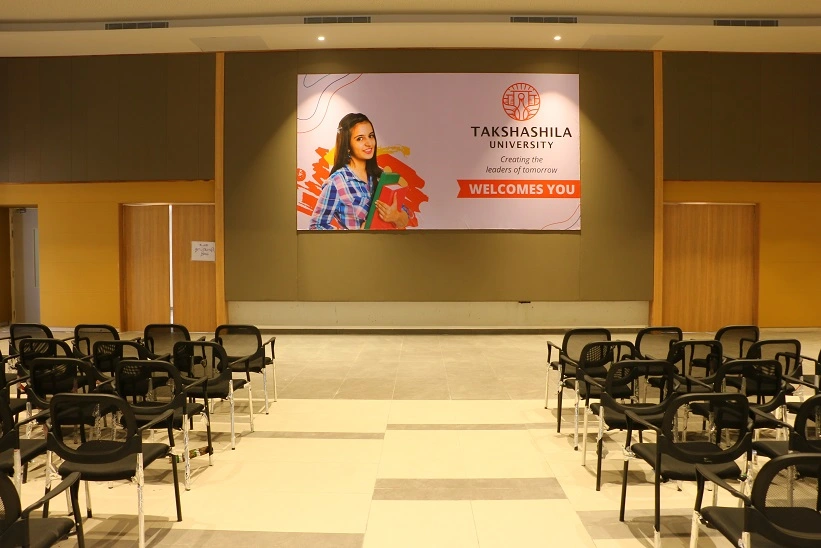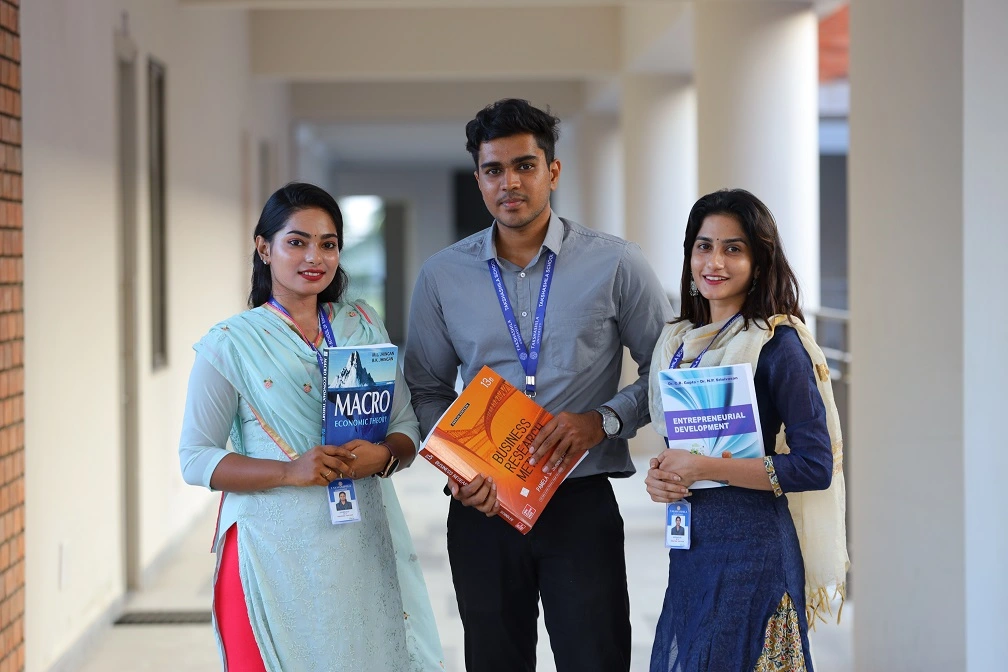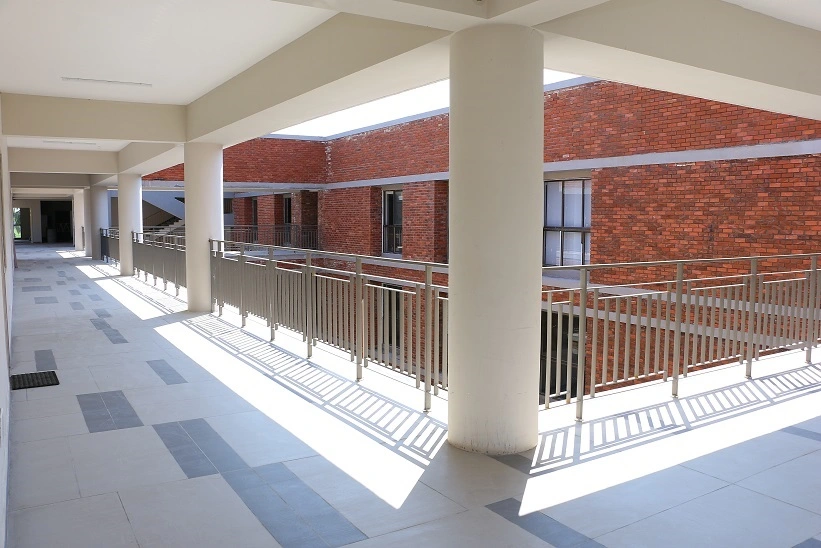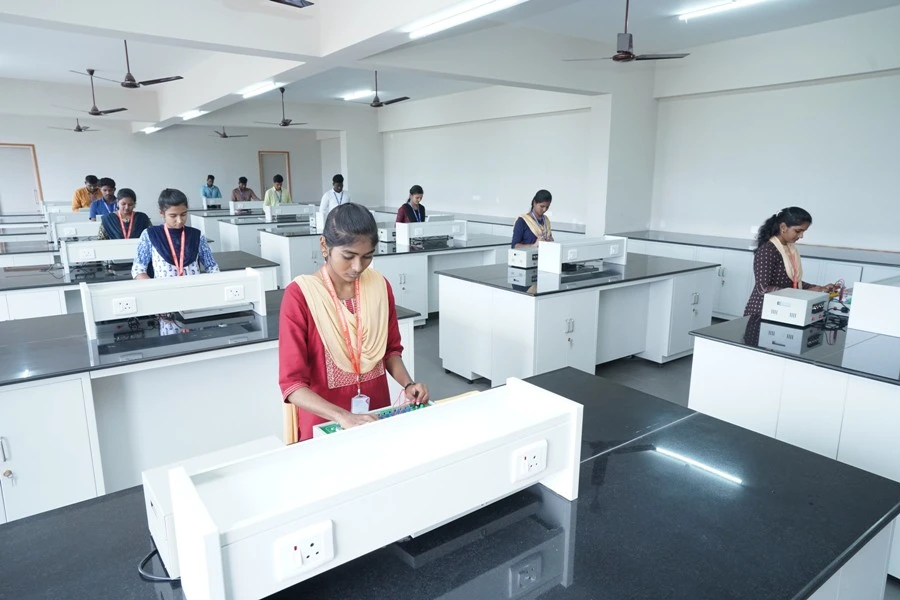M.Sc. Physics
- Hands-on Training
- Faculty with International Experience
- Advanced Curriculum
- Upto 100% Scholarship based on merit

About the Course
The M.Sc. in Physics is a two-year postgraduate programme designed for students who wish to gain a deep understanding of the fundamental principles of physics and their applications in various fields of science and technology. This advanced course provides an in-depth exploration of key areas such as quantum mechanics, electromagnetism, optics, statistical mechanics, and condensed matter physics. Through a combination of theoretical knowledge and hands-on laboratory experience, you will develop the skills necessary to pursue careers in research, education, and industry.
Course Curriculum

Year 1
The first year provides you with a solid foundation in classical and modern physics, including classical mechanics, electromagnetism, optics, and mathematical methods in physics. You will also begin studying quantum mechanics and statistical mechanics.
Key Subjects: Classical Mechanics, Electromagnetic Theory, Mathematical Methods in Physics, Optics, Quantum Mechanics, Thermodynamics and Statistical Mechanics.
Year 2
The second year focuses on advanced topics in physics, including condensed matter physics, nuclear physics, and computational physics. You will also undertake a research project or thesis, applying your learning to real-world problems and gaining valuable experience in scientific research.
Key Subjects: Condensed Matter Physics, Nuclear Physics, Solid State Physics, Computational Physics, Research Project, Advanced Quantum Mechanics.
Programme Outcomes (POEs)
Upon completing the M.Sc. in Physics, you will have developed the following competencies:
Advanced Knowledge of Physics Principles
You will possess a strong understanding of both classical and modern physics, equipping you to solve complex scientific problems.
Research Skills
You will gain hands-on experience in scientific research, developing skills in data analysis, problem-solving, and experimental design.
Critical Thinking
You will be trained to think critically, evaluate scientific literature, and apply theoretical principles to practical situations.
Technical Proficiency
You will develop proficiency in using modern laboratory equipment, software tools, and simulations to explore and model physical phenomena.
Effective Communication
You will refine your ability to communicate complex scientific concepts clearly, both in writing and orally, ensuring effective dissemination of research findings.
Collaboration in Research
You will learn to work collaboratively with other scientists and researchers, preparing you for roles in academic, industrial, and research environments.
Programme Outcomes (POs)
The M.Sc. in Physics will help you achieve the following broader learning outcomes:
PO1: In-depth Knowledge of Advanced Physics
You will acquire a comprehensive understanding of advanced topics in physics, such as quantum mechanics, nuclear physics, and condensed matter physics.
PO2: Research Methodology
You will develop a deep understanding of scientific research methods, preparing you to conduct independent research in various fields of physics.
PO3: Analytical and Problem-Solving Skills
You will develop the ability to solve complex problems by applying advanced mathematical and physical principles.
PO4: Practical Laboratory Skills
You will gain hands-on experience with laboratory equipment and research instruments, ensuring proficiency in experimental physics.
PO5: Scientific Communication
You will be equipped with the skills needed to present and publish scientific research, contributing to the broader scientific community.
PO6: Interdisciplinary Approach
You will learn to integrate knowledge from different areas of physics and related fields, enabling you to approach problems from diverse perspectives.
Career Scope
Graduating from the M.Sc. in Physics opens a wide range of career opportunities in academia, research, and industry. The skills you develop will be highly valued in sectors such as telecommunications, aerospace, energy, defence, and more. Potential job roles include:
Research Scientist
- Role: Conduct research in areas such as nuclear physics, quantum mechanics, or materials science, contributing to the development of new technologies.
- Salary: ₹6,00,000 to ₹12,00,000 per annum.
Physics Lecturer
- Role: Teach physics at the undergraduate or postgraduate level, conducting lectures, seminars, and supervising students.
- Salary: ₹4,00,000 to ₹8,00,000 per annum.
Data Scientist
- Role: Use advanced data analysis techniques and mathematical models to analyse and interpret complex data in industries such as technology and finance.
- Salary: ₹8,00,000 to ₹15,00,000 per annum.
Materials Scientist
- Role: Conduct research on materials and their properties, often in relation to new technologies, such as semiconductors or nanomaterials.
- Salary: ₹7,00,000 to ₹14,00,000 per annum.
Quantum Computing Researcher
- Role: Conduct research in quantum computing, exploring the use of quantum mechanics to develop the next generation of computers.
- Salary: ₹9,00,000 to ₹18,00,000 per annum.
Nuclear Physicist
- Role: Work in nuclear research or power plants, studying atomic and subatomic particles to develop new technologies in energy or healthcare.
- Salary: ₹6,00,000 to ₹12,00,000 per annum.
What You Will Gain at Takshashila University

Comprehensive Curriculum
The M.Sc. in Physics at Takshashila University offers a well-rounded curriculum that includes both theoretical learning and practical research experience, ensuring you gain a strong foundation in physics.
State-of-the-Art Laboratories
Gain hands-on experience in modern laboratories equipped with advanced instrumentation and tools for research in various areas of physics.
Experienced Faculty
Learn from experienced faculty members who are experts in their fields of physics, providing mentorship and guidance throughout your academic journey
Industry Collaboration
Takshashila University encourages interdisciplinary research, allowing you to collaborate with scholars from fields such as biotechnology, environmental science, and materials engineering. This broadens your academic scope and enhances your research impact.
Our partnerships with leading research institutions and industries provide you with opportunities for internships, collaborative research, and job placements.

To apply for the B.Sc. in Physics, candidates must meet the following criteria:
- Academic Qualification: Applicants must have completed their B.Sc. in Physics or equivalent with a minimum of 50% marks.
- Minimum Marks: Candidates from related fields of science may also be considered, subject to approval.
- Entrance Exam/Interview: Entrance exams or personal interviews may be required as part of the selection process.

For All Programmes except MBA, MCA, M.Tech, and Integrated Programmes offered by Sunstone, FacePrep, Kalvium and NxtWave
|
S.No |
% of Marks |
Scholarship Amount in Tuition Fees per year |
|
1 |
60% – 75% |
10% |
|
2 |
Above 75 % – 90 % |
25 % |
|
3 |
Above 90 % |
50 % |
Calculation of percentage of Marks (+2 of HSC / 2nd Year of APBIM or +2 of CBSE or Equivalent)
- Engineering – Average marks in Mathematics, Physics, Chemistry/Computer Science
- Lateral Entry – Average marks in Diploma Programme.
- Agriculture – Average marks in Physics, Chemistry, Biology / Botany &Zoology
- AHS / BPT / Pharmacy – Average marks in Physics, Chemistry, Biology / Botany &Zoology/Bio Tech
- UG – Arts & Science / Hotel Management – Overall +2 marks – (+2 of HSC / 2nd Year of APBIM or +2 of CBSE or Equivalent)
- PG – Overall % in UG
- Diploma – Average mark in 10th /Equivalent
MBA, MCA, M. Tech, and Integrated Programmes offered by Sunstone, FacePrep, Kalvium and NxtWave – No Academic Scholarship applicable.
Student Experience at Takshashila University
At Takshashila University, the M.Sc. in Physics provides an engaging, challenging, and rewarding educational experience. You will be involved in hands-on laboratory work, research projects, and academic discussions that will deepen your understanding of physics and its applications.
What you can look forward to

Hands-On Research
Engage in cutting-edge research projects that contribute to advancements in various areas of physics.

Collaborative Learning
Work with peers, faculty, and industry experts to solve complex scientific problems and share insights.

Exposure to Latest Technologies
Work with the latest equipment and software tools used in physics research, preparing you for future roles in academia and industry.

Global Perspective
Connect with global experts and institutions through guest lectures, workshops, and collaborative research opportunities.
Spread over 150 acres
At Takshashila University, you will have ample opportunities to hone your skills in real-world healthcare settings, utilising state-of-the-art medical facilities and simulation labs on our 150-acre campus.
Are you ready to take the next step in your physics career?
Frequently Asked Questions (FAQs)
What is the duration of the M.Sc. in Physics?
The course lasts for 2 years, divided into four semesters.
What qualifications are required to apply for the M.Sc. in Physics?
Applicants must have completed their B.Sc. in Physics or equivalent with a minimum of 50% marks.
Is there an entrance exam for admission?
Yes, in some cases, an entrance exam may be required as part of the selection process.
What career support is available for graduates?
Takshashila University offers career services to help students with job placements, internships, and networking opportunities within the physics and research sectors.









